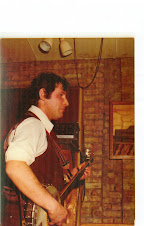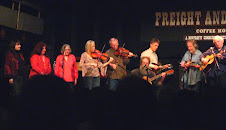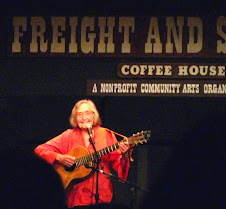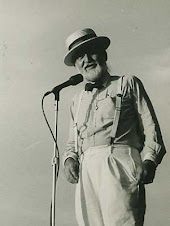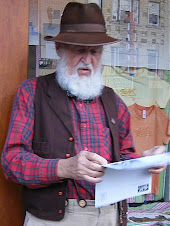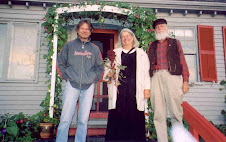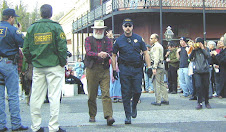Monday, July 21, 2008
Hello everyone, It's been a long time.
I had a thought, I've had a song rumbling around in my head for the last few weeks and instead of polishing it off myself I thought I would post a verse or two along with the chorus and and let folks contribute their own lyric to the pot and see what we come up with. So here we go.
Untitled
His Life was boom his life was bust.
His life was filled with wanderlust.
He tramped the world with a broken heart.
But now old friend it's time we part.
Chorus
There's a light on at the top of the stairs.
Rest your head weary hobo and linger no more.
The angles of the jungle will sing your sweet refrain
and we'll miss you like the dry earth misses the rain.
Please feel free to add whatever you wish. If you are more comfortable sending some thing by e-mail I will post it for you.
Duncan
I had a thought, I've had a song rumbling around in my head for the last few weeks and instead of polishing it off myself I thought I would post a verse or two along with the chorus and and let folks contribute their own lyric to the pot and see what we come up with. So here we go.
Untitled
His Life was boom his life was bust.
His life was filled with wanderlust.
He tramped the world with a broken heart.
But now old friend it's time we part.
Chorus
There's a light on at the top of the stairs.
Rest your head weary hobo and linger no more.
The angles of the jungle will sing your sweet refrain
and we'll miss you like the dry earth misses the rain.
Please feel free to add whatever you wish. If you are more comfortable sending some thing by e-mail I will post it for you.
Duncan
Wednesday, July 9, 2008
Poetry and music collide in the hands of Kell Robertson.
There is an idea of the Southwest that lives in the collective mind. It is embodied through stoic figures that represent unsympathetic landscapes where little is spoken. Poet and songwriter Kell Robertson was drawn to the Southwest by idealized images of the black-and-white films of his youth. His poems—published in more than 13 books—speak like the ghosts of another time.
In his poem “The Old Man Goes Home,” Robertson writes, “All I can see is what we’ve lost.”
It is this sense of longing for his childhood home in Elk City, Kan., that informs the memory of his friend Utah Phillips. Phillips was an enigmatic singer-songwriter, poet and labor organizer cast from Woody Guthrie’s America. Phillips, who died earlier this year, harbored no avarice, no reason to be something he wasn’t. It is an attribute that endeared him to other artists such as Tom Waits and Ani DiFranco, who would eventually cut two records with Phillips, one of which, Fellow Workers, earned a Grammy nomination.
Robertson headlines a celebratory event in memory of Phillips and his friendship. It is a fitting tribute filled with poetry, music and memories.
SFR: How did you first come to poetry?
KR: Probably with Percy Bysshe Shelley. My mother was an avid reader. By the time I went to school—at around the age of 8—I had read Shakespeare. I was lucky. She had the works of Shakespeare and the complete works of Zane Grey, so I had that influence.
That’s quite a reach from Shakespeare to Zane Grey.
Well, yeah…sorta…kinda, maybe, in a way. I went into the military and I got out of it because I hated it; I hated war. I hated the whole thing, so I grabbed my guitar and headed to Mexico and hung out here for a while and eventually hitchhiked across America. Writing became such a natural thing to me. I’ve read all the poets. I know all the stuff. I’ve read all the critics and all the academic jerks.
You’ve been called a beat poet. What do you think about that classification?
Well, you know, it’s very funny. On one of my books Lawrence Ferlinghetti wrote a blurb, ‘Kell is one fine cowboy poet.’ I’ve been called a beat poet, a
New Mexico poet…good God they’ve called me everything. I’m a guy who writes. Sure, I knew some of those people. Lawrence is a good friend. I was not a friend of Kerouac. I was in a skid row bar called the Mars Hotel on Third Street in San Francisco and Kerouac was in there. I went in and sat down. I recognized him and said, ‘Hey man, you’re Jack Kerouac.’ He said, ‘Just shut up and I’ll buy you a beer. Don’t say a goddamn word about it.’ So I didn’t. We just got drunk and that was it.
How did you meet Utah Phillips?
I met Utah in San Francisco years ago with Rosalie Sorrels, his singing partner at the time. He’s a reformed alcoholic, and I’m a perpetual drunk. The two of us walked around each other over the years. He would run into me and say, ‘Hey Kell, you still drinking?’
Utah never diverted from who he was…
No, he was a Wobbly all the way. He clung to those old ideas and I agree with him. He told stories better than anyone I’ve ever seen. He would talk about the old days with the Wobblies, the labor unions, traveling on box cars, about living as a hobo, fighting the cops. It was a time and a place that really happened. He could get really into what he did, which was talking about working people and being poor in America. He was the genuine thing.
You’ve lived in a lot places. Have those regions influenced your writing?
I grew up with poor people. I have an eighth-grade education, that’s it. The rest of it I got on my own, self-taught all the way. I love this country. I’m in the Southwest because I like the people and I love Mexican music. My mother took me to see Hank Williams [Sr.] in Shreveport, La. He dropped the microphone; he was drunk and he just blew everybody away. I looked at him and said, ‘I want to do that.’ And then I heard Dylan Thomas read and I said, ‘I want to do that.’
You think that kind of experience can still be had with young people, with poetry?
I don’t know; I worry about it. I don’t know if it’s possible at all. There’s about a million slam poets and poetry drill teams…I’m not sure if that does it any good. I think it’s something that you have to uncover on your own.
William Faulkner once said about his work, ‘I’m just a farmer who likes to tell stories.’ I’ve read some of your poems and I’m curious if you think people tend to over-think or overanalyze them.
Those stories in the songs and the poems are personal. I did most of those things or at least I knew people who did. Of course, in the back of your head, if you have a sense of language and understand rhetoric, line, meter and all that crap…the poem or the song just comes to you.
There is an idea of the Southwest that lives in the collective mind. It is embodied through stoic figures that represent unsympathetic landscapes where little is spoken. Poet and songwriter Kell Robertson was drawn to the Southwest by idealized images of the black-and-white films of his youth. His poems—published in more than 13 books—speak like the ghosts of another time.
 Don’t call Kell Robertson a beatnik, just call him a writer. |
In his poem “The Old Man Goes Home,” Robertson writes, “All I can see is what we’ve lost.”
It is this sense of longing for his childhood home in Elk City, Kan., that informs the memory of his friend Utah Phillips. Phillips was an enigmatic singer-songwriter, poet and labor organizer cast from Woody Guthrie’s America. Phillips, who died earlier this year, harbored no avarice, no reason to be something he wasn’t. It is an attribute that endeared him to other artists such as Tom Waits and Ani DiFranco, who would eventually cut two records with Phillips, one of which, Fellow Workers, earned a Grammy nomination.
Robertson headlines a celebratory event in memory of Phillips and his friendship. It is a fitting tribute filled with poetry, music and memories.
SFR: How did you first come to poetry?
KR: Probably with Percy Bysshe Shelley. My mother was an avid reader. By the time I went to school—at around the age of 8—I had read Shakespeare. I was lucky. She had the works of Shakespeare and the complete works of Zane Grey, so I had that influence.
That’s quite a reach from Shakespeare to Zane Grey.
Well, yeah…sorta…kinda, maybe, in a way. I went into the military and I got out of it because I hated it; I hated war. I hated the whole thing, so I grabbed my guitar and headed to Mexico and hung out here for a while and eventually hitchhiked across America. Writing became such a natural thing to me. I’ve read all the poets. I know all the stuff. I’ve read all the critics and all the academic jerks.
You’ve been called a beat poet. What do you think about that classification?
Well, you know, it’s very funny. On one of my books Lawrence Ferlinghetti wrote a blurb, ‘Kell is one fine cowboy poet.’ I’ve been called a beat poet, a
KELL ROBERTSON WITH JOE WEST, KENDALL MCCOOK, MITCH RAYES, RICHARD MALCOLM, GEORGIE ANGEL AND PATRICK HOULIHAN 7 pm Monday, July 14 $5 Santa Fe Brewing Company 35 Fire Place 424-9637 |
How did you meet Utah Phillips?
I met Utah in San Francisco years ago with Rosalie Sorrels, his singing partner at the time. He’s a reformed alcoholic, and I’m a perpetual drunk. The two of us walked around each other over the years. He would run into me and say, ‘Hey Kell, you still drinking?’
Utah never diverted from who he was…
No, he was a Wobbly all the way. He clung to those old ideas and I agree with him. He told stories better than anyone I’ve ever seen. He would talk about the old days with the Wobblies, the labor unions, traveling on box cars, about living as a hobo, fighting the cops. It was a time and a place that really happened. He could get really into what he did, which was talking about working people and being poor in America. He was the genuine thing.
You’ve lived in a lot places. Have those regions influenced your writing?
I grew up with poor people. I have an eighth-grade education, that’s it. The rest of it I got on my own, self-taught all the way. I love this country. I’m in the Southwest because I like the people and I love Mexican music. My mother took me to see Hank Williams [Sr.] in Shreveport, La. He dropped the microphone; he was drunk and he just blew everybody away. I looked at him and said, ‘I want to do that.’ And then I heard Dylan Thomas read and I said, ‘I want to do that.’
You think that kind of experience can still be had with young people, with poetry?
I don’t know; I worry about it. I don’t know if it’s possible at all. There’s about a million slam poets and poetry drill teams…I’m not sure if that does it any good. I think it’s something that you have to uncover on your own.
William Faulkner once said about his work, ‘I’m just a farmer who likes to tell stories.’ I’ve read some of your poems and I’m curious if you think people tend to over-think or overanalyze them.
Those stories in the songs and the poems are personal. I did most of those things or at least I knew people who did. Of course, in the back of your head, if you have a sense of language and understand rhetoric, line, meter and all that crap…the poem or the song just comes to you.
© Copyright 2000-2008 by the Santa Fe Reporter
Tuesday, July 8, 2008
July 4, in Nevada City









I drove from my home in Salt Lake to spend a long relaxing weekend with Joanna, Morrigan and my new adopted home, Nevada City Ca. Normally I drive I80 only because it is faster than US 50. But when I gassed up in Wendover I could not resit the urge to head down 90 to Ely Nevada turn right and drive out US 50. I spent the night in Ely at the Nevada Hotel, thirty five bucks for a room, give me a break what a great deal. I left late Thursday night so when I rolled into Ely at almost midnight a beer some blackjack and a good nights sleep hit the spot. If you have never driven highway 50 put it on your things to do list. It is billed as the loneliest road in America and indeed it is, I passed only a smattering of cars and trucks along the way and because of the lack of traffic the road itself is in great shape and perfect for cruising. I was in a bit of a hurry so I didn't make the usual stop in Eureka for lunch and a visit to the Opera house, maybe next time. I did stop a Shoe Tree. For those of you not familiar with shoe tree it is a huge tree of the North side of the road adorned with shoes hanging form every branch. The story of I heard ( from dad ) was that a young couple ran away to elope and threw their shoes in the tree for good luck. Anybody that knows dad knows t was a much longer story but you get the idea. If any body out there has a different tale please do post it. Highway 50 seems longer than 80 but actually it's only adds 60 miles to the trip which equates to about two hours drive time because the winding nature of the road and the amazing vistas and views along the way.
I got to Nevada City later than normal but in tome to enjoy a tasty bar- b-que chicken dinner With Joanna, my little sister Morrigan, Molly Fisk and Kuddie. We sat around the patio table munched on chicken and of course corn on the cob, after all it was the 4Th, caught up on things and enjoyed the smoke free night. Smoke free nights have become rare in the summer nights of California.
It sure was nice to be back in town with family and friends. Later in the evening we took the shuttle to the fair ground for the fire works show. After the drive it was a long day but one I would have gladly walked to California for.
The next day Ben Pearl and his girl friend Mia drove up from Davis for a visit, Ben sang Sweet Briar at Dad's funeral and has become a good friend since our first meeting in Portland several years back when we were up there for Winterfolk.
The day was topped off with dinner Jordan's house. Joanna and I dined with his wife Susan, daughter Emma and son James and of course Jordan. After a magnificent pasta dinner we sat on the front porch sipped Port and smoked cigars under a faint sliver of moon. It was my first encounter with that end of a cigar but it truly was a special occasion and a fitting tribute.
The night ended and morning came far to quickly. before I knew it I was once again on the road headed for home. The few short days felt like a month and were just what I needed to recharge my batteries.
More later
Duncan
Tuesday, July 1, 2008




I'm headed to Nevada City for the weekend and hang out with Joanna and Morrigan. I don't like the idea of shelling out two days pay for the gas but it shore will be nice to them. I will post from the little green house over the weekend. There is a lot of stuff in the works and plenty to catch up on. Mark and Jenny sent some nice pictures from the Rose Tattoo Rendezvous last month that I will pass along.
Duncan
Subscribe to:
Comments (Atom)










